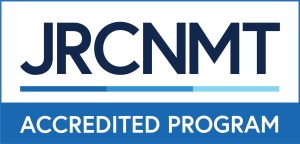What is nuclear medicine?
Nuclear Medicine at Mizzou prepares students to become certified nuclear medicine technologists. This field offers distinctive insights into the function and metabolism of organs and tissues, helping diagnose and treat a wide range of medical conditions. Upon graduation, students are eligible to take board exams.
Don’t just take our word for it. Watch the video below to learn more about nuclear medicine.
What classes will I take?
Before entering the clinical phase of the program, students complete general education requirements and program prerequisites. The program includes a secondary application process, where students must apply and be accepted to proceed to the clinical phase.
Nuclear medicine students learn about key areas like patient care, radiopharmaceuticals, imaging procedures, radiation safety, and instrumentation. This includes classes such as:
- Regulation of Radioisotopes
- Radiopharmaceuticals in Nuclear Medicine
- Nuclear Medicine Instrumentation
- Clinical Rotations
Are there experiential learning opportunities?
Yes! The University of Missouri believes in learning by doing. The Nuclear Medicine bachelor’s degree program includes more than 1,000 hours of clinical experience. In fact, the entire last year of the nuclear medicine program takes place in a clinical setting, where students are able to apply their classroom knowledge in real-world scenarios.
Become a nuclear medicine major
You can pursue a nuclear medicine degree at any point in your career at MU. To begin the clinical phase of the Nuclear Medicine program, students must complete a secondary application and receive admission.
- New students: Apply to MU and choose Nuclear Medicine – Pre Health Sciences as your major.
- Current students: Declare or change your major.
Frequently asked questions
A major in nuclear medicine is ideal for students passionate about science, health care and technology, and who want to use cutting-edge imaging techniques to help diagnose and treat medical conditions. It is an excellent choice for those seeking a dynamic and meaningful healthcare career that blends science, technology and patient interaction to make a real impact on medical care.
A bachelor’s degree in nuclear medicine prepares graduates to sit for board exams through the Nuclear Medicine Technology Certification Board (NMTCB) and the American Registry of Radiologic Technologists (ARRT). Nuclear medicine technologists work in hospitals, imaging clinics, medical clinics, universities, diagnostic labs and research centers.
Mizzou Nuclear Medicine graduates have also gone on to become hospital administrators, researchers, physicians, and manufacturing and sales industry experts.
Mizzou’s Nuclear Medicine degree prepares you for your future by offering hands-on clinical rotations in a variety of clinics across Missouri, Kansas and Nebraska. These clinical experiences allow students to apply their classroom knowledge in real-world settings, gaining valuable practical skills and insights into the field.
This program has a secondary application. Students typically apply to the clinical phase of the program during their sophomore year. Learn more about the Nuclear Medicine clinical phase application.
This program accepts up to 40 students each year. Currently, we do not generally get more applications than there are spots.
In addition to the University tuition and fees, room and board, and personal expenses, a Nuclear Medicine student will have additional costs associated with the program. View Nuc Med program costs and fees.

Program accreditation
The University of Missouri Nuclear Medicine program is accredited by the Joint Review Committee on Educational Programs in Nuclear Medicine Technology.
JRCNMT
820 W. Danforth Rd., #B1
Edmond, OK 73003
(405) 285-0546
mail@jrcnmt.org
Nuclear Medicine program outcomes and student learning objectives
Institutional accreditation
University of Missouri Institutional Accreditation is provided by
The Higher Learning Commission
30 North LaSalle Street, Suite 2400
Chicago, IL 60602-2504
(800) 621-7440
See the University of Missouri Provost’s Office website for professional licensure disclosure information.
